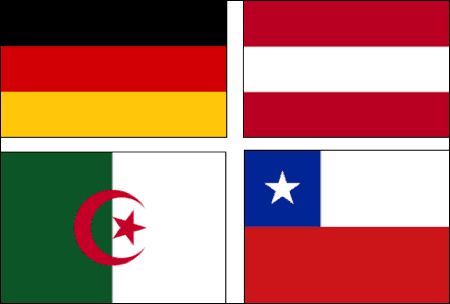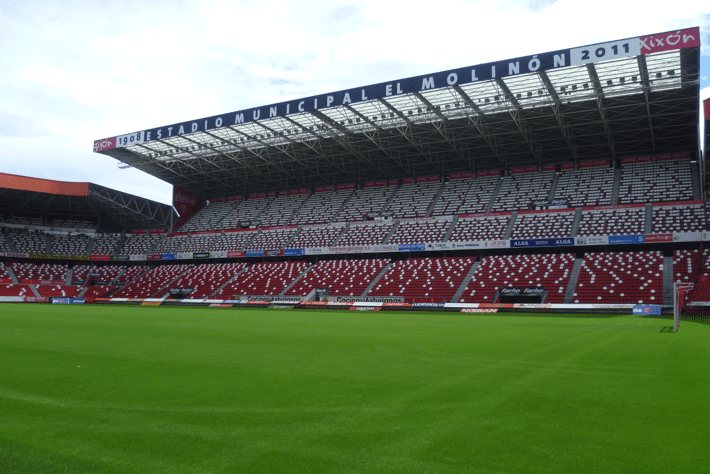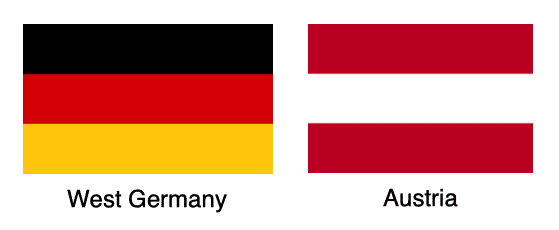 Part of the joy of the World Cup comes in the fact that all teams have, in theory at least, an equal chance of winning it. Whilst some countries have won the tournament multiple times and others have never won it at all, there is something about FIFA’s flagship competition that is about fairness and what is right. It is why moments that might not be fair live so long in the memory, such as 1966 when England won the competition after Geoff Hurst’s shot hit the crossbar and bounced down, in spite of the fact that many West Germany fans say it didn’t cross the line.
Part of the joy of the World Cup comes in the fact that all teams have, in theory at least, an equal chance of winning it. Whilst some countries have won the tournament multiple times and others have never won it at all, there is something about FIFA’s flagship competition that is about fairness and what is right. It is why moments that might not be fair live so long in the memory, such as 1966 when England won the competition after Geoff Hurst’s shot hit the crossbar and bounced down, in spite of the fact that many West Germany fans say it didn’t cross the line.
Football in general is about two teams going up against one another in the moment, without anything other than the result in front of them being what they are concerned about. Little wonder, then, that what happened in a World Cup match between West Germany and Austria in the 1982 World Cup is something that has gone down in history, variously being referred to as the ‘disgrace of Gijón’, the ‘shame of Gijón’ or some other various of that that tells you something happened that left people reeling. It was a collusion between two sides that benefitted them both, but left the world disappointed.
The Background
First things first, then, and the background to what happened. Austria, West Germany, Algeria and Chile were put in a World Cup group together during the days when two points were awarded for a win and one was given for the draw. Algeria got things off in surprising style by defeating West Germany 2-1 on the opening day of the tournament, which was being hosted by Spain. It was considered to be the biggest World Cup upset for nearly three decades, with Algeria being the first African or Arabian team to defeat a European one in the World Cup.
It put West Germany on the back foot immediately, with Algeria losing to Austria before defeating Chile, which made them the first team from Africa or an Arab country to win twice in any World Cup. West Germany had already defeated Chile, with just their game against Austria to come. Because Algeria’s final group game against Chile was played the day before West Germany and Austria went head-to-head, it left both teams knowing exactly what results they needed in order to progress to the next round, with Chile eliminated from the tournament after three defeats.
Here is how the table looked going into the last game:
| Team | Games Played | Games Won | Games Drawn | Games Lost | Goals For | Goals Against | Goal Difference | Points |
|---|---|---|---|---|---|---|---|---|
| Austria | 2 | 2 | 0 | 0 | 3 | 0 | +3 | 4 |
| Algeria | 3 | 2 | 0 | 1 | 5 | 5 | 0 | 4 |
| West Germany | 2 | 1 | 0 | 1 | 5 | 3 | +2 | 2 |
| Chile | 3 | 0 | 0 | 3 | 3 | 8 | -5 | 0 |
The Match Itself

Austria’s clean sweep and positive goal difference meant that only a defeat of three goals or more would result in their qualification for the next round coming into question. For their part, meanwhile, West Germany knew that a 1-0 or 2-0 win would see them progress thanks to the fact that they would have the same number of points as Algeria but a better goal difference. The West Germans went for an approach of all-out attack during the opening stages, finally getting on the scoresheet thanks to a cross from the left that resulted in a goal from Horst Hrubesch.
At that point, West Germany had four points, the same as Algeria, but a goal difference of +3 compared to the Algerian’s 0. For their part, Austria also had four points, with their goal difference reading +2, meaning that both teams were progressing. The only hope that Algeria had was for Austria to get a goal and level the scoring. Unfortunately for Algeria, neither team had any plans to try to score a goal. Whichever team was in possession of the ball just passed it back and forth between players in their own half, only doing something else with it if an opposition player came near them.
If that happened, the ball would be kicked long into the opposition’s half and the whole process would start over again. Walter Schachner was making an effort for the Austrians, but he was very much on his own. Meanwhile, Wolfgang Dremmler was trying for the Germans, but wasn’t getting much help from the rest of his team. Everyone watching deplored the performance and the effort from most of the players on the two teams, with the ARD commentator in Germany, Eberhard Stanjek, eventually refusing to commentate on the game because of what was happening.
Match Reaction
It wasn’t just Eberhard Stanjek that was entirely unimpressed with what was happening on the pitch. When El Comercio, the local Spanish newspaper, printed a match report, they put it in their crime section. Robert Seeger was commentating for Austrian television and asked viewers to turn off their sets, whilst the New York Times journalist, George Vecsey, suggested that the teams ‘seemed to work in concert’, though admitted that proving it would be an impossible task. Many of the spectators in the stadium were just as unimpressed as the commentators.
There were chants of ‘Fuera, fuera!’ from those in the ground, which translated to ‘Out, out!’ Others chanted the name of Algeria, with Spanish fans shouting ‘¡Que se besen, que se besen!’, translating roughly as ‘Let them kiss’, which is commonly chanted at weddings and suggestive of desiring some form of contact. There were angry Algeria supporters who waved banknotes in the faces of the players, whilst the fans of Austria and West Germany were hoping for a rematch of the classic Miracle of Córdoba, where Austria had beaten West Germany, with a West Germany fan burning the national flag in protest.
What Happened Next
The win for West Germany meant that the final standings in the table looked as follows:
| Team | Games Played | Games Won | Games Drawn | Games Lost | Goals For | Goals Against | Goal Difference | Points |
|---|---|---|---|---|---|---|---|---|
| West Germany | 3 | 2 | 0 | 1 | 6 | 3 | +3 | 4 |
| Austria | 3 | 2 | 0 | 1 | 3 | 1 | +2 | 4 |
| Algeria | 3 | 2 | 0 | 1 | 5 | 5 | 0 | 4 |
| Chile | 3 | 0 | 0 | 3 | 3 | 8 | -5 | 0 |
Three teams finished the group with four points, but that meant that goal difference was the crucial factor. As a result, West Germany finished top of the group, whilst Austria went through in second place and Algeria were knocked out with Chile. Austria had given up their opportunity to finish at the top of the group in exchange for a guarantee of progressing at Algeria’s expense. They made the choice because West Germany were clearly the better team and might well have defeated Austria by enough to knock them out. Austria ended up in a group with France and Northern Ireland in the second group stage.
West Germany, meanwhile, ended up in a group with England and the hosts Spain. The game had also seen less aggression than it might otherwise have done because all of Horst Hrubesch for West Germany, Josef Degeorgi and Roland Hattenberger were on a possible suspension having already picked up yellow cards. Whilst they might well have progressed, there were furious spectators waiting for them at their hotel throwing eggs at the players in protest. Algerian officials lodged a complaint, but it was impossible to prove that collusion had genuinely taken place.
In a small sense of justice, Austria were knocked out of the World Cup at the second group stage. France won both of their matches, meaning that they progressed with four points, whilst Austria and Northern Ireland drew their match against one another and both were knocked out. West Germany did make it through, finishing top of their group over England and Spain, defeating France on penalties in the semi-final before facing Italy, who had beaten Poland in their semi-final match. The final saw the Italians win 3-1 to ensure that West Germany’s cheating wasn’t rewarded.
Was It a Fix?
 Nowadays, the ‘Disgrace of Gijón’ has gone down in World Cup folklore, with everyone accepting that there was collusion between the two teams. Interestingly, journalists later took another look at the game and decided that things weren’t as clear cut. Writing for the Irish Times, Rob Smyth noted that the ten minutes coming after the goal from Hrubesch might be described as ‘exhilarating’ in some cultures, with Friedrich Koncilia having to produce a fine face from Wolfgang Dremmler, whilst Paul Breitner missed two good chances to score and the West German’s played on the counter-attack.
Nowadays, the ‘Disgrace of Gijón’ has gone down in World Cup folklore, with everyone accepting that there was collusion between the two teams. Interestingly, journalists later took another look at the game and decided that things weren’t as clear cut. Writing for the Irish Times, Rob Smyth noted that the ten minutes coming after the goal from Hrubesch might be described as ‘exhilarating’ in some cultures, with Friedrich Koncilia having to produce a fine face from Wolfgang Dremmler, whilst Paul Breitner missed two good chances to score and the West German’s played on the counter-attack.
In the 77th minute, Hans-Peter Briegel made a brilliant save from Bernd Krauss that would have seen West Germany knocked out of the competition had it gone in. The suggestion from Smyth was that things weren’t as clear cut as we’ve all come to accept. That being said, Reinhold Hintermaier eventually acknowledged that there had been some collusion, albeit it wasn’t decided ahead of kick-off. He said, “It somehow took on a life of its own; everyone just thought that they wanted to get ahead.”
Rules Changed
 It would be untrue to suggest that the game between West Germany and Algeria was the only one taking place during the World Cup in 1982 that had some sense of unfairness. Spain’s game versus Northern Ireland took place the day after the other group games, meaning that Northern Ireland knew that if they won 1-0 then both teams would progress. The Northern Irish went 1-0 up and the game then petered out, even after Mal Donaghy had been sent off in the 63rd minute. Still the Spanish didn’t push for an equaliser, but it didn’t garner as much attention as the result between West Germany and Austria.
It would be untrue to suggest that the game between West Germany and Algeria was the only one taking place during the World Cup in 1982 that had some sense of unfairness. Spain’s game versus Northern Ireland took place the day after the other group games, meaning that Northern Ireland knew that if they won 1-0 then both teams would progress. The Northern Irish went 1-0 up and the game then petered out, even after Mal Donaghy had been sent off in the 63rd minute. Still the Spanish didn’t push for an equaliser, but it didn’t garner as much attention as the result between West Germany and Austria.
Whilst FIFA felt that there was no way to prove collusion in the wake of the match, the organisation did decide to change the rules surrounding the tournament from the 1986 World Cup onwards. The manner in which teams knew what result they needed heading into the final group game because of other matches being played the day before was considered to be unfair, so the decision was taken to kick off all final group game matches at the same time in the competition from then on. It was a decision that has been mirrored by other major tournaments ever since.